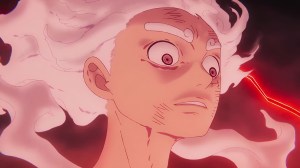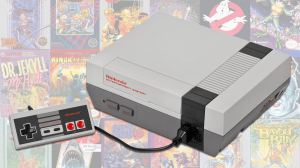Amazon Prime’s Tales From the Loop has been out in the world for several weeks now, and it has taken viewers on an unexpected sci-fi journey in the process. The series, which is inspired by Simon Stalenhag’s series of paintings and RPG of the same name, follows the citizens of Mercer, Ohio. A small Midwestern town that is stationed around the Mercer Center for Experimental Physics, or “The Loop”, Mercer becomes plagued by a series of unexplained phenomena caused by the center’s particle accelerator.
Videos by ComicBook.com
One of the most instrumental people working behind-the-scenes on Tales From the Loop is Nathaniel Halpern, who served as the series’ creator and writer. Halpern is no stranger to bizarre and genre-bending TV, including Legion, Manhattan, and Outcast. But with Tales From the Loop, Halpern crafts a web of a narrative that is emotional, surprising, and legitimately optimistic.
ComicBook.com got a chance to chat with Halpern about Tales From the Loop‘s debut, and the unintended consequences of the series debuting during the current COVID-19 pandemic. In the process, we spoke about where Tales From the Loop could go in a second season, how Legion impacted the series, and more.

Simon’s Paintings
ComicBook.com: How did you first become familiar with Tales from the Loop as an entity? Because it seems like such an interesting source material to draw from.
Nathaniel Halpern: Yes, I agree. I was introduced to Simon’s paintings by the director Matt Reeves and his producing partners. They showed them to me and I had this reaction that I think a lot of people have when they see Simon’s work, which is this just this wonderfully unique aesthetic that he created.
I found his paintings to be quite emotional. They’re very poignant, more often than not. So that notion of a science fiction world that looks unique and also could be emotional. Then, on top of that, the idea of adapting paintings into a show. All of that seemed incredibly exciting, so I jumped at the opportunity.
Narrative
It seems like the idea of adapting a series of paintings into a consistent narrative would be a challenge. How did you approach that side of it?
It’s interesting to describe because it happened so quickly. It just fell into place with how to go about it. There are things I wanted to capture and preserve in Simon’s work, and there was also other structures that, in hindsight, I realized influenced it. For instance, he’s got Kieslowski’s The Decalogue, which is a series of 10-hour films.
Then there’s a book called Winesburg, Ohio by Sherwood Anderson, which is a portrait of a town, and each chapter is its own little short story of someone who lives there. I was fans of these kinds of structures in these other mediums. It fell into that realm for two reasons essentially.
Each one [of Simon’s paintings] has a unique science fiction element to it. So with each painting you look at, that sense of wonder is reset. That’s what I was striving for. How can you always keep the wonder alive, and you never get too comfortable in the show? That presented this notion of every hour, introducing a unique science fiction premise or element. You never get to that “I get it” moment.
Then, on top of that, and more importantly, is from a character perspective. I knew I wanted to tell these emotional stories, and I’ve been describing the show, on some level, an empathy-delivery device. So I needed to make characters you could relate to. And there’s a great alchemy and storytelling of: there’s an ordinary person, they encounter this extraordinary thing and they go on a journey.
But the danger you run in with television is when an ordinary person goes on too many adventures, they cease to be ordinary, and you can’t really relate to them. That then dictated a new character, who maybe we’ve just seen off to the side, will step up and take center stage. So we can always have that balance of, “Here’s someone I can relate to,” and then they encounter something extraordinary that’s also new to us. It’s that marriage between wonder and wanting to relate to the characters.
Parallel
my favorite episode of the season was “Parallel”. I just found it really thought-provoking and emotional. I love what you said, of Gaddis Is a supporting character before that point, and then he takes center stage and has this really emotional love story.
It’s the kind of thing that’s fun. If you go backwards, for instance, if you go into Episode 5, you see him in the tavern writing in his journal to Alex, and you wouldn’t have known that at the time. But on a second viewing, you realize, “Oh, he’s writing to Alex in that scene.” There are these wonderful ways to drip-feed the character and their life, without you realizing it.
What inspired you to tell that story in particular? Because it fits within the world of the show in such an interesting way, especially with how the sci-fi aspects are used in other episodes.
I think the way I approached the individual story, it started from an emotional place. I would try to think of a feeling we all have in one way or another that could be seen as universal. That one, for me, very much started with a little bit of almost a love letter to loneliness. Then seeing that painting that Simon had, where it’s that tractor, which we recreated in the show. There seems to be a guy in it, then there’s a guy standing beneath the tractor.
It came over me: what if that was the same guy? Then from there, it snowballs into what it became. It evolves into a love story, which naturally flows out of loneliness. Then you have that element of: what is making this person lonely? Maybe the fact that we can shut off opportunities of connection because someone doesn’t check all the boxes, whether that’s romantic or not. Those elements all were swirling together, and that’s how “Parallel” came to be.
Favorite Episode
Is there an episode that is your favorite out of Season 1? I know it’s like picking children.
Yes.
Plus, everyone I’ve talked to about the show thus far has a completely different response to different episodes.
I find that to be really interesting. Hearing from one person like, “Oh, this far and away the best episode.” Hearing someone else didn’t like that episode, but they love this other one. It’s fascinating to see which ones people connect to the most. It almost reflects back on, I guess, what they’re going through emotionally and they relate to the most.
I would say I don’t have a favorite episode, for the reason you said. Also, I find the show celebrates all these little moments. It’s designed to have all these little moments that hopefully can linger with the audience. I know that, for me, I carry with me moments from films and shows that I love. I’ve long since forgotten the plot, but I can remember a moment, a visual, a little bit of behavior, or a detail. There are so many of those things in Tales in the Loop that I just love, and they’re scattered over all the episodes.
Legion
You worked on Legion before Tales From the Loop, and I feel like those two shows have such an interesting parallel. They’re both cerebral and sci-fi in completely, wildly different ways. Did working on Legion influence Tales From the Loop at all?
Not in a creative way. I would say in a very practical [way]. Legion with this wonderful experience for me, of really learning the machinery of making television and understanding what’s possible. So I was prepared to step up and have this be my first show. I would say Legion just was a big influence, truthfully in that regard, as a producer-writer. And understanding what it is to make television, how difficult it is and being able to problem-solve.
I would also say, Legion has that playfulness of “anything is possible”, and there’s always something new around every corner. I think that’s something I embrace in general, always wanting that sense of wonder to be kept alive. That’s probably another thing that crosses over between the two.
Audience Response
What do you hope people take away from watching this series, especially now, given the current worldwide situation?
Obviously, the show was made before our current situation, and it’s just strange timing that it’s coming out now. I always knew I wanted this to tap into an emotional experience that we don’t get very often on television. Usually, there’s a lot of stories that mine anger and anxiety. Here, I wanted to really, as I said earlier, tap more into empathy and make people not feel so lonely. I always get moved where I see something. and think that’s exactly how that feels. I feel the same way.
I wanted to tell stories where people could perhaps see themselves in it, and take comfort in that. I’ve been getting some wonderful feedback. It’s nice that people, in the unfortunate time we’re in being isolated, are taking comfort and watching the show. That was always the hope, so I’m very pleased on that front.
Season 2
If Tales From the Loop gets renewed for a second season, where would you want the story to go? It seems like, especially given the way that Season 1 ends, that anything is possible.
What’s wonderful is that The Loop itself is this storytelling-generating device. I always knew that from the beginning, there’s this engine to tell a seemingly-endless number of stories in this town. What fascinates me is to continue to create an even bigger tapestry and sense of reality in the town of Mercer, and really get to know more of the people there and just keep growing that reality.
***
Season 1 of Tales From the Loop is now available on Amazon Prime.








